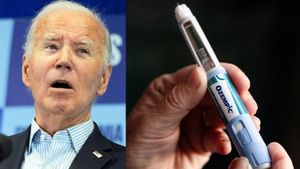A new clinical trial has brightened the hopes of many impacted by HIV, showing promise for lenacapavir, an innovative, twice-yearly injection for HIV pre-exposure prophylaxis (PrEP). Conducted by prominent researchers at Emory University and Grady Health System, this study highlights its remarkable efficacy when compared to existing treatment options.
Currently, many individuals at risk of HIV rely on daily oral medications like PrEP, which includes Truvada. These medications, though highly effective, demand rigorous adherence; missing doses can significantly decrease their effectiveness. The newly tested lenacapavir, on the other hand, merely requires users to receive it twice annually, opening up exciting possibilities for HIV prevention access.
Published on November 27, 2024, in the New England Journal of Medicine, the results of this Phase III trial—dubbed the Purpose-2 trial—have garnered significant attention. Dr. Colleen Kelley, the study's lead author and professor at Emory, emphasized the monumental advancement this injectable treatment can provide. "Seeing these high levels of efficacy—at almost 100%—in an injectable administered every six months is incredible," she stated.
The study found staggering results: only two of the 2,179 participants receiving lenacapavir contracted HIV, compared to nine infections among the 1,086 participants prescribed Truvada. According to the data, this reflects an unprecedented 96% reduction in risk overall.
Dr. Kelley pointed out health disparities impacting treatment adherence, noting, "What we see over time is about half of people who initiate daily oral PrEP discontinue within the year due to various factors. Having effective injectables needed only twice annually is especially significant for people who struggle with health care access or sticking to daily pill regimens." The trial included diverse populations, featuring cisgender men and gender-diverse individuals from various regions, including the United States, South Africa, and Brazil.
The clinical trial's impact is already being felt as it included groups often marginalized within the healthcare system, such as Black or Hispanic individuals among the participants, where recent statistics show over half of new HIV infections were documented among cisgender gay men, with 70% of those falling within racial minorities. This inclusivity showcases the trial's emphasis on serving the communities hit hardest by HIV.
Valeria Cantos, another prominent co-investigator at the Grady research site, revealed their commitment to equitable access throughout the recruitment process. With bilingual materials and staff, they catered to various language needs, illustrating the trial's push for broader representation.
The trial's focus shines light on an alarming trend: the adherence gap. Participants initially showed high adherence to oral PrEP; 82% reported taking at least four pills weekly after eight weeks, but this number dropped to just 62% by the one-year mark. This dwindling commitment often leads to breakthrough infections, highlighting the need for more flexible treatment alternatives.
Interestingly, lenacapavir is not entirely new. It is already licensed for treating HIV within heavily treatment-experienced adults. Gilead Sciences, the manufacturer, has committed to seek regulatory approval for lenacapavir as PrEP, with high hopes for approval by 2025.
Dr. Carlos del Rio, chair of the Department of Medicine at Emory, commented on the broader public health perspective. He stated, "The results of this study bolster our arsenal of tools available for HIV prevention. Long-acting antiretrovirals like lenacapavir offer renewed hope for individuals who have trouble maintaining consistent oral medication regimens." The primary challenge now lies not just in the drug's development but also ensuring equitable access once it reaches the market.
This call for fairness is echoed by researchers and public health advocates, bringing attention to disparities seen globally. Lenacapavir incurs high costs, with estimates around $43,000 annually within the United States, sparking concerns over accessibility—especially compared to Truvada, which is available for less than $50 yearly.
Addressing this price gap is imperative for enabling widespread access and impact. Gilead has projected to engage in partnerships with six pharmaceutical companies to manufacture cheaper versions of lenacapavir, aiming for distribution within low- and middle-income countries where HIV incidence rates are among the highest.
Reflecting on the future, Dr. Onyema Ogbuagu, principal investigator of Purpose-2, remarked, "We are at a crossroads in the HIV epidemic. If approved, lenacapavir could be transformative as we work to achieve the UNAIDS 2030 targets, offering people innovative prevention options to fit their varied lifestyles."
With lenacapavir showing extraordinary potential to reduce new HIV infections significantly, researchers and stakeholders are advocating for the healthcare system to bolster its outreach strategies. The fight against HIV has taken significant steps forward, but continuing to build on this success—ensuring equitable access—is key to truly transforming HIV prevention strategies globally.



